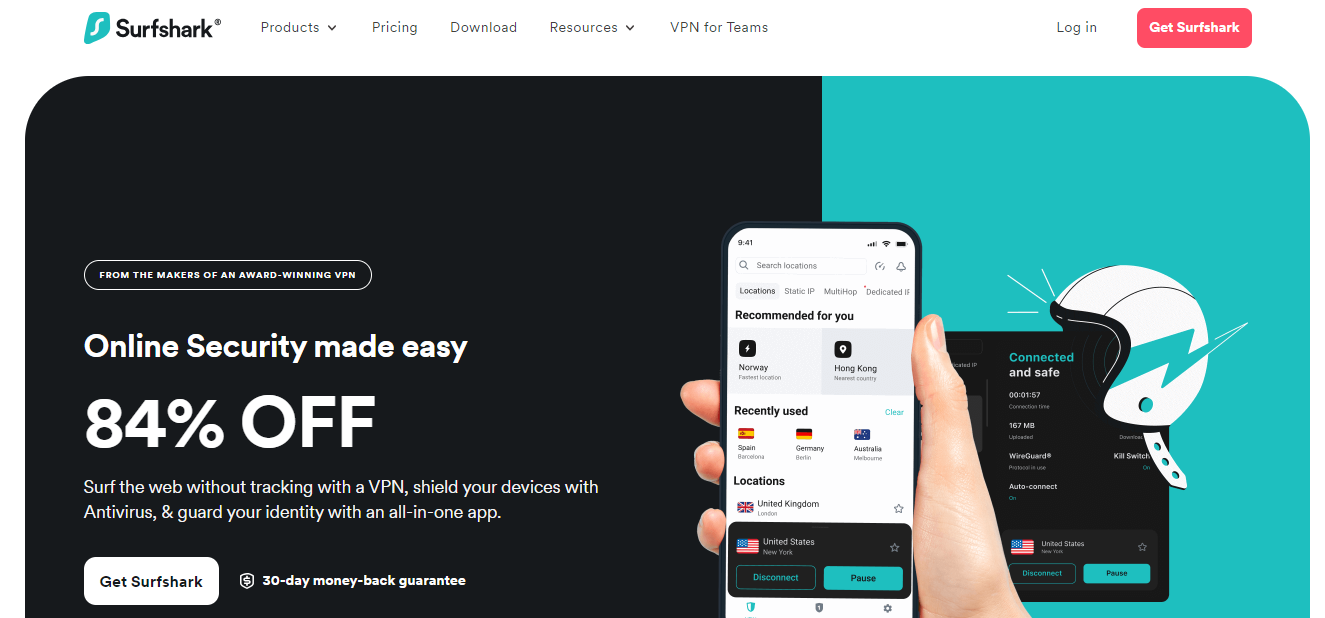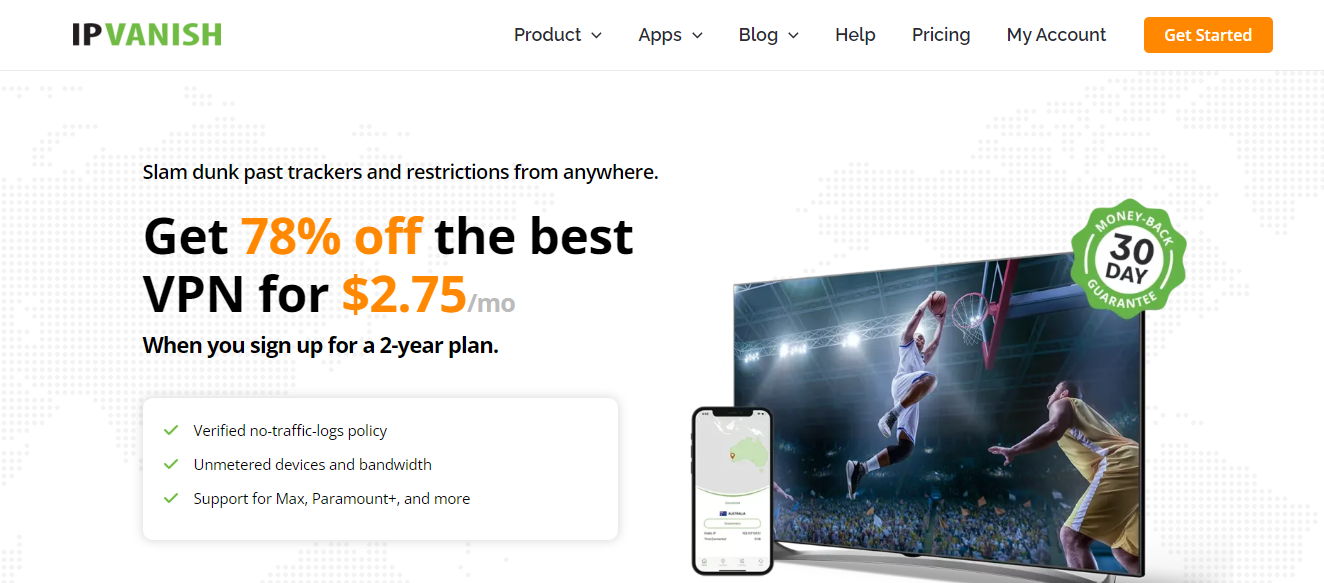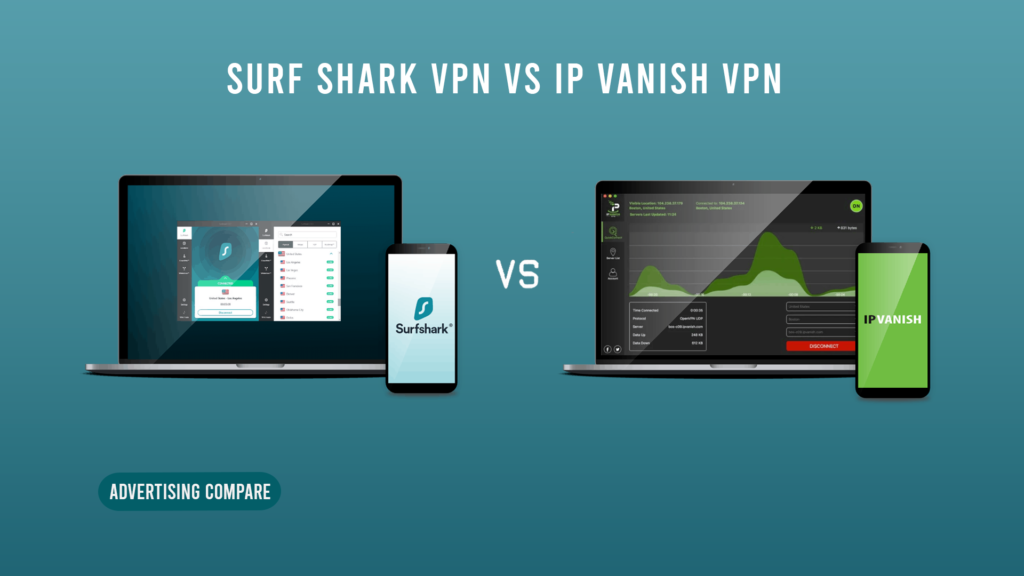Important Takeaways: IPVanish vs. Surfshark Comparison Surfshark is faster, more reliable, and less expensive in the long run than IPVanish. This is the primary distinction between the two services. Additionally, Surfshark has a bigger server network composed of RAM-only computers, which provide privacy. The monthly plan that IPVanish offers is less expensive than Surfshark’s.
IPVanish vs Surfshark, it’s difficult to decide between IPVanish and Surfshark based just on marketing claims. According to Surfshark, its VPN service is quick and inexpensive, utilizing “next-generation” technology. Similar to this, IPVanish markets itself as the “best VPN” and boasts a sizable server network along with excellent streaming service unblocking capabilities. To help you decide between Surfshark and IPVanish, our comparison sifts through the technical details.
Rather than accepting the VPNs’ claims at face value, we put them through a battery of rigorous testing across multiple categories.IPVanish vs SurfsharkBased on your demands, you may use our results to determine which VPN provider to sign up with. We’ll declare in the conclusion which VPN is the best all around. See our reviews of IPVanish and Surfshark for additional information about VPNs.
A quick comparison of IPVanish vs Surfshark
A quick comparison of IPVanish vs SurfsharkAt $2.19, both VPN providers have the most affordable plan. Surfshark vs IPVanishWhile IPVanish offers a smaller server network and fewer apps than Surfshark, both companies permit an infinite number of concurrent connections.
1. Surfshark:

- Instruments: Infinite
- Servants: Over 3200 servers across 100 nations
- Procedures: OpenVPN, IKEv2, and WireGuard
- Apps and platforms that use the VPN: Linux, Chrome, Firefox, Edge, Fire TV, Apple TV, iOS, Android, Windows, macOS, and
- Monthly cost: $2.19 for a two-year plan
- round-the-clock assistance: Verify
- independently examined: Browser add-ons, server setup, non-logging, and Android applications
2. IPVanish:

- Instruments: Infinite
- Servants: 2,200+ servers across 56 nations
- Procedures: IKEv2, OpenVPN, IPSec, and WireGuard
- Apps and platforms that use the VPN: Linux, Chrome, Fire TV, Windows, macOS, iOS, and Android
- Monthly cost: $2.19 for a two-year plan
- Round-the-clock assistance: Verify
- Independently examined: Absent logging
Two high-end VPN services with unrestricted simultaneous connections and superior encryption are Surfshark and IPVanish. What else is there to search for, then?
-
Quickness
Surfshark vs IPVanishin the discussion of what constitutes a decent VPN, speed comes first. We’ll examine the main elements influencing VPN speed. After that, we’ll do some testing to see which giant of the business provides faster speeds.
The following factors will influence the real VPN connection speed:
- the infrastructure of the servers;
- security procedures applied;
- The location, number, and caliber of servers that the VPN service offers.
Therefore, if you’re utilizing a VPN, you should monitor your upload and download speeds as well as any increases in ping time. Your data transfer speed is expressed in megabits per second (Mbps), which is the unit of measurement.
What is better Surfshark or IPVanish Because every one of us is from a different part of the world with a varied internet connection, it is OK for the taken speed results to vary.
Results of the speed test
- A hand with an internet speed-measuring speedometer in it.
- Crucial information for understanding the test findings:
We selected two locations, one extremely far from us and the other relatively nearby;
- We ran ten tests at each location; the average speed is displayed below. Next, we contrasted the internet speed findings between using and not using a VPN.
- We made use of Ookla’s Speedtest.net;
- The percentage information indicates how much your speed decreases.
- Use a server that is closer to us for a speed test.
1. Surfshark:
- Not a drop
- 37 percent
- 7 times faster than average
2. IPVanish:
- Not a drop
- 63 percent
- 82%
- three times faster than the average
In the near server test, Surfshark’s ping increased by 1.7 times, and in the far server test, by 23 times; in contrast, IPVanish’s ping increased by 3 times and 25 times, respectively. Remember that the outcomes will vary according to where the tests are conducted.
Important lesson learned:
According to the test results Surfshark vs IPVanish, Surfshark performed better when testing with closed servers; there was no discernible difference between the results while testing with distant servers. But location is one of the most crucial aspects of speed, so be careful where you take the speed test.
It’s also crucial to remember that there are multiple barriers preventing internet speed from increasing, two of which are server location and quantity.
What is better Surfshark or IPVanishAccording the paper, IPVanish has 25Gbps servers, whilst Surfshark employs 10Gbps servers. These figures represent the available bandwidth. The diameter of the internet “pipe” is represented by server bandwidth (Gbps/Mbps); the larger the diameter, the more internet “water” (data) that can pass through. However, in practice, these figures don’t really matter that much.
Server Output
The problem is that a single server has a single, constrained bandwidth “pipe.” All of its users share that bandwidth. You will experience slower internet speeds as there is less bandwidth available for each additional user as there are more. More servers for users to join means less populated servers – faster browsing for you.
How does your internet speed depend on the location of the server? Consider browsing a website. The data travels over fewer networks the closer you are to the web server. A shorter route for the data means faster browsing for you.
Furthermore, a server’s location affects geolocation and Geo restriction, two more crucial factors. You can reach more affordable markets by having access to a wider pool of servers located in other nations. More markets = more servers = lower costs.
Now that we’ve proved that here, quantity DOES equal quality, let’s look at the number and locations of servers.
Number and locations of servers
Both VPNs provide global coverage and overlap in common areas such as Europe, Asia, North and South America, and Oceania. Surfshark, on the other hand, stands apart due to its global server network. The locations and number of servers for each platform are displayed in the table below:
1. Surfshark:
- Servants: 3200+
- Nations (total):100
2. IPvanish:
- Servants: 2200+
- Nations (total): 56
- Want a list with more details? You are in our hands. Although they don’t have a single IPVanish server, the following nations are home to Surfshark servers:
- Europe: North Macedonia, Andorra, East Turkey, Georgia, Greenland, Isle of Man, Liechtenstein, Lithuania, Malta, Monaco, Montenegro, and Bosnia and Herzegovina;
- Americas: Venezuela, Ecuador, Panama, Paraguay, Bahamas, Belize, Bolivia, Uruguay, and Ecuador;
- Asia: Macau, Mongolia, Myanmar, Nepal, Philippines, Sri Lanka, Uzbekistan, Vietnam, Azerbaijan, Bangladesh, Bhutan, Brunei, Cambodia, Indonesia, Kazakhstan, Laos;
- Africa and the Middle East: Nigeria, Algeria, Egypt, and Morocco.
- I must tell you the truth now: IPVanish claims to have more US servers. While Surfshark has over 600 US servers, they only have 1,106. However, the overall server pool of Surfshark is larger.
Speaking of servers, Surfshark provides dedicated IPs and static IP servers for users who want reliable IPs in their desired server nations.
-
Lesson learned:
IPVanish has more servers in the US, however Surfshark has more servers spread over the globe.
Features
While both VPNs encrypt data, only one is more feature-rich than the other. Here is a brief rundown of the features they provide:
Obfuscation, also referred to as Surfshark’s Camouflage mode, conceals the fact that you’re utilizing a VPN. even from the Internet Service Provider, or ISP. It is used by both IPVanish and Surfshark; however, IPVanish obfuscates using the Shadowsocks protocol, whereas Surfshark only obfuscates using the OpenVPN (UDP or TCP) protocols.
1. GPS deception:
GPS spoofing, also referred to as GPS override, gives the impression that you are somewhere else. It’s available in IPVanish and Surfshark*.
2. User disguising:
Surfshark provides Alternative ID, a user masking tool that functions similarly to an email alias, in addition to its VPN. For online sign-ups, it creates a phony email address and bogus credentials in order to conceal real user information. IPVanish doesn’t provide these kinds of user disguising tools.
3. Divided tunneling:
Split tunneling, sometimes referred to as Bypasser at Surfshark, allows you to send only a portion of your data—of your choosing, naturally—through a VPN. It facilitates the separation of VPN-required and VPN-free activities. It’s available from IPVanish and Surfshark.
4. Deactivate Switch:
If the VPN connection abruptly ends, Kill Switch turns off your internet access. Nobody likes to get caught with their pants off, do they? Both IPVanish and Surfshark have it (Surfshark has it on Android, iOS, macOS, Windows, and Linux, but IPVanish does not enable Kill Switch on Linux or iOS).
5. No-logs guidelines:
A VPN provider that has a no-logs policy won’t keep track of your browsing history, IP address, network traffic, consumed bandwidth, online activities, or DNS queries. The only information it retains is the bare minimum required to run the service. IPVanish and Surfshark both adhere to the no-logs policy.
6. Pop-up blocker for cookies:
It is an add-on for browsers that refuse and decline all cookies. You can choose which websites’ cookies are essential and turn off the extension to allow cookies from those websites. It’s exclusive to Surfshark.
7. No Borders configuration:
This only applies if you live in a nation that restricts internet freedom or outlaws VPNs. With the aid of this feature, you may use your Surfshark app and view the list of top servers that are now blocked by your network. It’s exclusive to Surfshark.
8. Advertisement block:
It’s what we at Surfshark call CleanWeb. Clicking on a fraudulent advertisement is one way to get malware onto your computer. Adding a tool that prevents these kinds of adverts from appearing while you browse seemed sensible. It’s available in IPVanish and Surfshark.
9. Adaptive multi-hop:
This function, sometimes referred to as double VPN, allows you to route your data over multiple servers that are connected to boost security. IPVanish does not use it, however Surfshark does.
10. Nexus:
Surfshark conceals your IP address by using a global network of servers. When you connect to Nexus, instead of using a single VPN tunnel, your internet traffic is routed via a network of servers. It’s exclusive to Surfshark (all VPNs).
11. SugarSync:
Secure cloud storage with cross-device compatibility for up to 500 GB. It’s exclusive to IPVanish.
12. Automated launch:
a function that, as soon as there’s an internet connection, launches your VPN immediately. IPVanish and Surfshark both provide it. Based on the sheer quantity of unique features, Surfshark provides more than IPVanish.
13. Privacy and security:
Most VPN users base their choice of VPN on security considerations. Numerous factors, including protocols, security features, adherence to policies, encryption, server infrastructure, and location, affect that security.
13. The use of encryption:
Encrypting data using various encryption standards is the main function of a VPN. In this sense, AES 256-bit encryption combined with ChaCha20 is the VPN industry standard, and both Surfshark and IPVanish employ it.
14. Server setup:
Server infrastructure can be used as an additional security measure. Here, Surfshark outperforms IPVanish* since we leverage RAM-only servers, which further advances our zero-logging policy. Because we are unable to store user data for an extended period of time, RAM-only servers prohibit the physical removal of any information from them.
This adds an additional degree of protection by immediately erasing any data on a hard drive when a server is turned off.
Naturally, trust is just as important as all the security technology. Performing audits and adhering to policies are two ways to develop credibility and strengthen it.
Both VPNs make a big deal out of adhering to the no-logs policy in this regard. However, IPVanish had a “oopsie” a few years ago when they were run by a different management team; they recorded activities and sent them to the police. Since then, Leviathan, an independent auditor, has attested to IPVanish’s compliance with the no-logs policy.
Speaking of audits, Cure53 has conducted independent audits of Surfshark’s server infrastructure and browser extensions. Additionally, our no-logs policy was confirmed by one of the Big Four auditing firms, Deloitte.
2023 saw the successful completion of an independent Mobile App Security Assessment (MASA) security audit for Surfshark’s Android app.
Surfshark is more likely to keep your online activities private and secure based on its server infrastructure, security features, audits, and past performance.
15. Smartphone applications:
What is better Surfshark or IPVanishThere isn’t much to discuss because IPVanish and Surfshark both provide end-to-end data encryption for all popular mobile devices. Furthermore, IPVanish and Surfshark provide router encryption, enabling you to use a VPN on an infinite number of devices.
The Surfshark One bundle provides antivirus software for Android mobile users in addition to general security.The same is true for IPVanish and their antivirus software, VIPRE.
Both IPVanish and Surfshark provide excellent online security for mobile devices, and users can choose to add an additional layer of protection via their antivirus software.
16. Plans & Prices:
All VPNs provide secure online access, regardless of the plan you select. Additionally, the pricing structure follows the same idea: a longer plan entails a lower monthly payment. Although both service providers accept payment in the most common ways, it appears that only Surfshark offers a cryptocurrency payment option.
A 30-day money-back guarantee is also provided by both.
1. Surfshark:
- $15.45 per month for one month
- $12/month plus three months free for a year.
- 24 months: $2.19 monthly plus a complimentary three months
2. IPVanish:
- $10.99 each month for one month
- $12/month plus three months free for a year.
- 24 months: $2.19 monthly plus three months complimentary
- For their most affordable plan, both companies charge $2.19. Yet, IPVanish’s one-month plans are more affordable.
17. Client assistance:
As usual, the best ways to get support are by email and live chat. But there’s more to select from, and highlighting the distinctions is vital. Offering phone assistance, IPVanish thrives, while Surfshark dominates with its continuously updated video instructions.
Both suppliers give technical help via articles and videos, and they respond to inquiries promptly. With few exceptions, IPVanish and Surfshark are equivalent. Because of its over-the-phone service, IPVanish maintains a significant position in this category despite its lack of innovation in the video department. Bravo to them!
Conclusion: IPVanish vs. Surfshark: The Ultimate Results
The winning boxer’s glove is raised in the air by one hand. IPVanish has servers with greater bandwidth and cloud storage options; on the other hand, Surfshark offers more perks in other categories at a lower cost.

